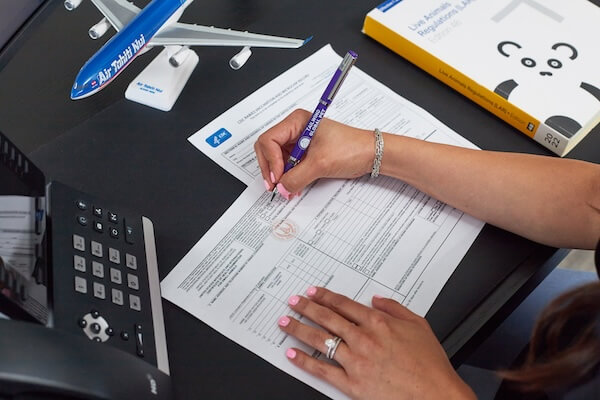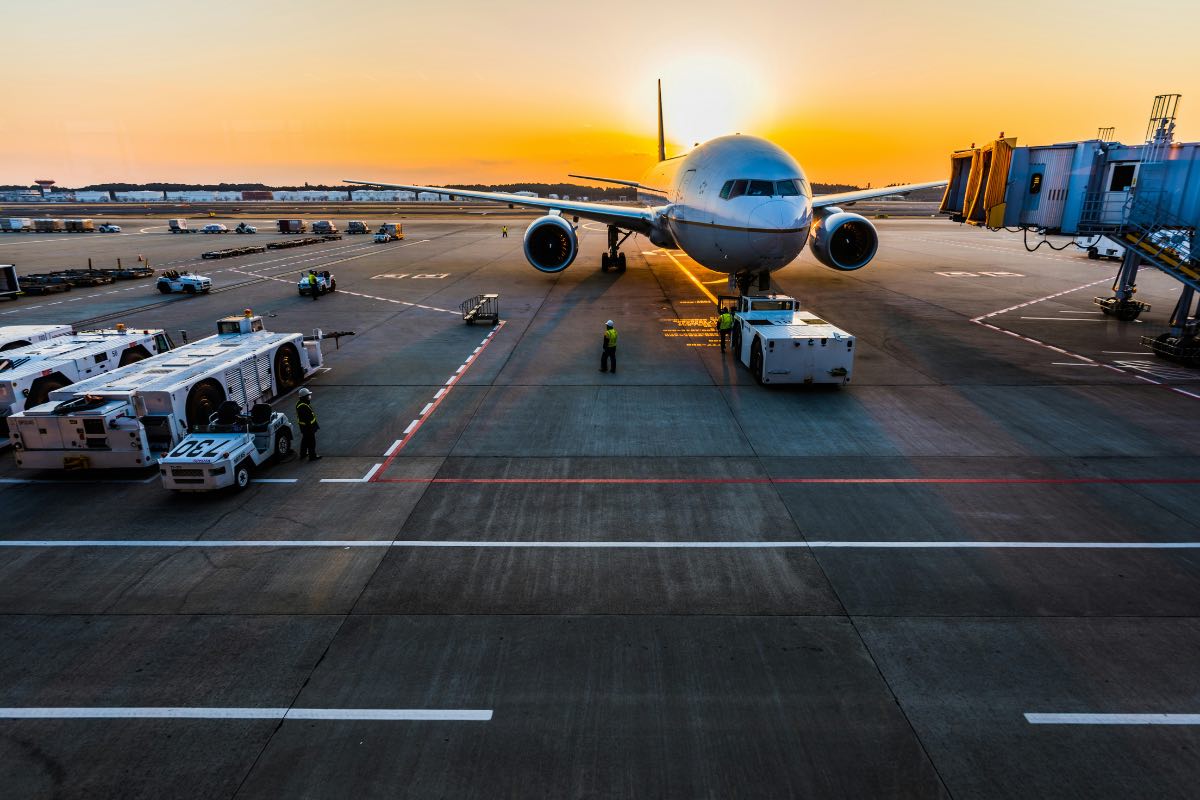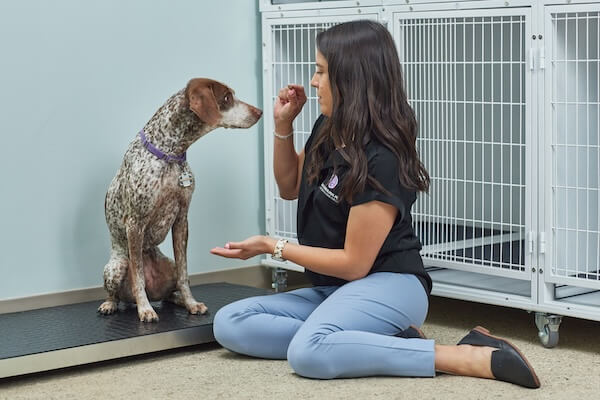
Bringing your pet to Japan? We’ve handled tons of pet exports to the Land of the Rising Sun — let us help with yours.
Traveling to Japan is easier today than it was when pets had to meet quarantine requirements to be allowed into the country. The entire process is still a long one, though, with several timelines to keep track of around vaccination, testing, and document requirements.
Our step-by-step guide details everything you need to know for the most efficient trip possible for your pet, including when travel arrangements are best left to the experts.
Eligible Pets and Country Restrictions
Japan does not have breed bans on cats and dogs, but the airline you choose to transport your pet might have active restrictions on breeds considered aggressive and/or snub-nosed pets. Import requirements differ based on your pet’s origin point.
Eligible Pets
Japan does not have active breed bans on pets, but airlines flying to Japan might. All Nippon Airways (ANA), for example, has a breed ban on what they describe as short-headed dogs. These are snub-nosed breeds like bulldogs, boxers, pugs, and Cavalier King Charles Spaniels.
Singapore Airlines has restrictions on both snub-nosed dogs and cats (e.g., Persian and Burmese), and dogs often described as strong-jawed breeds. This includes mastiffs, pit bulls, and crosses of those types of dogs.
If you’re planning to travel with a dog or cat or moving pets on one of these lists, we can help make sure you know all of your options before giving up hope. There may be a pet-friendly airline you haven’t considered that offers more flexibility.
Approved Countries
Import requirements fall into 2 categories: designated or non-designated. Designated countries and regions include only Iceland, Australia, New Zealand, Fiji, Hawaii, and Guam.
These are considered rabies-free origin points, so pets from these countries are not subject to the rabies vaccination and testing requirements of destinations not on this shortlist. Pets coming from these countries must still travel with microchips and health certificates.Every other country, including the United States, is on the non-designated list. As Japan is considered rabies-free itself, pets returning to the U.S. from Japan aren’t subject to requirements set by the CDC for high-risk countries for rabies.
Read Next: U.S. Airline Pet Policy Guide: Fly With Your Pets Stress-Free
Planning an international flight for your pet? We can help.
Microchip and Vaccinations
Japan is considered a rabies-free country, so all cats and dogs arriving in Japan from non-designated countries must be microchipped and vaccinated for rabies.
Microchip
Cats and dogs should be microchipped with an ISO-compliant microchip before arrival. Microchips should be implanted before a pet’s first rabies vaccination. (Microchipping and vaccination on the same day works, too.)
If that’s not possible, your pet’s export health certificate should note that the first vaccination happened before microchip implantation. In that case, the pet should also have a rabies titer collected on the day of their second vaccination. You should contact the Animal Quarantine Service (AQS) ahead of time if you’re in this situation to prevent delays upon arrival.
It’s best practice to have your vet check that your pet’s microchip is easily readable by international scanners to avoid complications at customs clearance. If there’s any issue reading the microchip, it’s up to the importer to provide a scanner for customs officials in Japan.
Vaccinations
Pets traveling to Japan must show a history of at least 2 rabies vaccinations. Initial vaccination should happen when a pet is at least 91 days old. (Your pet’s date of birth counts as day 0.) The second rabies vaccination should come at least 30 days after the first, but before the first expires.
If your pet’s vaccine expires before they get to Japan, they should receive an additional vaccination within the effective period. Any lapses in between vaccines mean you’ll need to start the process over.
All vaccines should be inactivated (killed) virus vaccines or recombinant vaccines that comply with standards set by the World Organization for Animal Health (WOAH).
There are no additional vaccine requirements for pets arriving in Japan, no matter the exporting country, but there are a few recommendations for traveling pets.
Japan recommends the following for arriving dogs:
- Canine distemper
- Infectious canine hepatitis
- Canine parvovirus (CPV)
- Canine parainfluenza
- Leptospirosis
The following vaccines are recommended for cats:
- Feline calicivirus
- Feline panleukopenia (FPV or feline parvovirus)
- Viral rhinotracheitis
Talk to your vet about additional recommendations they may have for vaccines based on your pet’s health history.

Blood Tests and Treatments
Japan’s rabies titer requirements are straightforward, but the required waiting period can feel cumbersome for owners planning a relocation or pet shipping.
All pets arriving in Japan from a non-designated country must do so with a rabies titer test. Serum samples can be collected from the day of their second rabies vaccination until the end of that vaccine’s effective date. It’s then possible for your pet to get their second rabies vaccine and titer test on the same day.
Titer tests should be carried out at a lab approved by the Minister of Agriculture, Forestry, and Fisheries of Japan. Results must be greater than or equal to 0.5 IU/ml. Test results are valid for 2 years from the sample date, as long as your pet’s vaccines don’t expire within that timeframe.
Following testing, there is a 180-day waiting period before your pet is eligible for import. (Your cat or dog’s blood sampling date is counted as day 0.) Timing is essential here. Your pet must arrive in Japan within both the validity period of their rabies vaccination and the 2-year validity period of the rabies antibody test.
If your pet’s antibody test expires before their arrival, they don’t have to repeat the 180-day waiting period as long as rabies vaccinations have been kept up to date without any gaps. They’ll also need a new, valid antibody test.
If your pet arrives in Japan before completing the 180-day waiting period, it will be required to complete a quarantine period until the remaining time is met. We always recommend that pets arrive in Japan with that 180-day wait completed in their home country. It’s just more comfortable and less stressful for traveling pets.
Outside of rabies titers, Japan doesn’t have additional requirements for testing or treatments. They do, however, recommend treatments for both external (mites and fleas) and internal parasites (nematodes and tapeworms) no more than 4 days before your pet’s flight.
Import Documents
Japan requires advance notification of all pet imports to the AQS no less than 40 days before arrival. This is similar to import permit requirements in other countries.
This process is available online through the Nippon Automated Cargo and Port Consolidated System (NACCS). You can also fax or mail your forms, but it’s important to make sure that they’re going to the right AQS with jurisdiction over your intended air or seaport.
Forms are unique to the type of pet you’re importing, but they all require information like microchipping dates, rabies vaccinations, and dates of rabies titers.
Pets also need an export health certificate endorsed by the USDA’s Animal and Plant Health Inspection Service (APHIS) no more than 10 days before boarding. This form confirms that your pet is healthy enough to travel and free of any signs of infectious disease. Officials list rabies and leptospirosis as two areas of concern for this final inspection.

There are a few different versions of acceptable health forms. At Tailwind, we use Form AC. It combines all of the health certificate requirements into one document.
Pets can also arrive with an exporter’s declaration (Form A), but these should be attached to an additional export health certificate (Form C). Both should be completed by a USDA-accredited veterinarian and endorsed by APHIS.
The International Health Certificate (APHIS Form 7001) is another option. These are available from accredited vets, but must also come attached to a Form A. Both should be endorsed by APHIS.
The only exception to these processes is for active military personnel who receive health certificates from a military vet. They can send in forms without APHIS endorsement. This does not apply to retired military personnel and their families.If it’s not possible to complete this requirement within the 10-day timeframe, contact the AQS. They may be able to provide you with an extension, but it’s not guaranteed. Our pet experts have never had issues with this, as documents can be electronically endorsed without hard copies.

Airline Options
The best options for travel to Japan are the most direct routes. We prefer working with ANA and their cargo arm for arrivals into Tokyo, as they have multiple flights daily to Haneda Airport.
Singapore Airlines is another option with a direct flight to Tokyo’s Narita International Airport, but it’s limited to one flight per day.
For pet owners with breeds restricted by those 2 airlines, like snub-nosed dogs and cats, Lufthansa is an option with fewer breed restrictions. Your pet will need to fly through Europe on those itineraries, though, so we don’t suggest this option unless absolutely necessary.
Quarantine
Pets that meet all import requirements will be released to their owners within 12 hours of their arrival. Japanese officials call this time period a quarantine, but it’s really just the maximum time needed for an import inspection to check through your pet’s documents and scan their microchip.
Generally, AQS officers get through this last step much faster, as long as pets arrive without complications, like missing paperwork or microchip issues. Visible signs of injury or illness could also delay your pick-up time.
Pets that don’t meet Japan’s entry requirements for rabies vaccinations and titer testing are subject to up to 180 days in an import quarantine facility.
How Tailwind Can Help
At Tailwind, we’re more than pet transportation services for traveling and relocating pets. We work with pet owners from the start of their planning process to pick-up at their destination. That includes navigating long timelines and required documentation in countries like Japan.
No matter where you’re going and where you’re starting from, we can help you get your pet there safely on as efficient a route as possible. We’re the pet travel experts.

Ready to get started? Each pet relocation situation is different, so to get an idea of the costs involved, fill out a quote request.
See What Our Clients Have to Say

“Absolutely would recommend Tailwind Global Pet to anyone needing to transport their pet internationally. Email correspondence was professional and efficient. During the actual transport of our cat, staff were quick to provide updates. Overall excellent experience, always had full trust in this team throughout the entire planning and transport process. Highly recommend!”
– Cianna S.

“I was so nervous to ship my fur babies overseas, but our airline recommended Tailwind Global Pet. From our first phone call with Brady, we felt comfortable with our decision because of his knowledge and professionalism. He confidently answered every question through many years of experience. Tailwind handled everything from the veterinary exams to the USDA certificate. Most importantly, our dogs arrived at our door happy and in great shape. I will definitely use their services again and I highly recommend to anyone that needs to ship their pets.”
– Jamie G.

“Excellent service!! It was so comfortable to have them pick our dog and take care of everything. We used their veterinary service for all paperwork, it was very stress free. At our layover, we saw our dog being the first out to go to their special sector and then we saw him being uploaded back into the next plane as we were almost ready to take off, so the dog wasn’t in there for too long. Our dog is happy at home!”
– Maria M.
